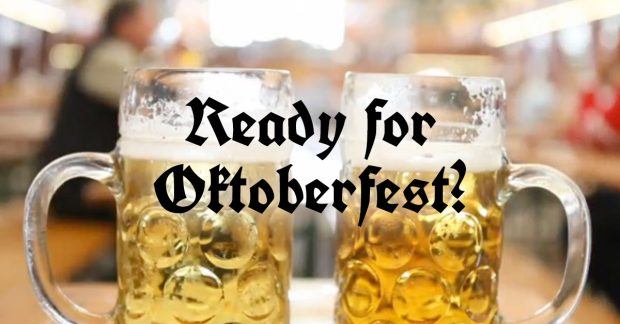SPONSORED — Oktoberfest is perhaps the most German thing about Germany. It’s so closely associated with German culture that thousands of cities across the world celebrate with their own Oktoberfest-themed parties, events and festivals. But nothing beats the original.
Here’s the thing about Oktoberfest, though. While it’s very much “German,” it’s actually not. The Wiesen (as it’s locally called—after the filed it takes place in) is distinctly Bavarian. While other cities across Germany celebrate the beer harvest each September and October, nothing compares to the Munich celebration. And even all the other cities’ Oktoberfest celebrations are all modeled after the original from Munich.
And in Munich, the language may be officially German, but it’s actually Bavarian—a distinct regional dialect that’s surprisingly different than the High German that’s most recognizable and widespread. In Berlin, I’ve learned High German using a variety of methods—courses, watching movies, and online software programs like Rosetta Stone. But then when it comes to understanding my Bavarian friends in their local dialect—nope! It just doesn’t compare to the German I already know.
That’s where online programs like Rosetta Stone come in handy. In advance of this month’s Oktoberfest, they released a free crash course in Bavarian—the language essentials to have an easy (and fun) time at Oktoberfest. Try the free tutorial here and then practice at the Oktoberfest in Munich (or your local one!). Maybe it’s all the beer, but somehow I find it easiest to speak German at big festivals like the Oktoberfest—and easier still with a few essential Bavarian words.
German Bavarian Words to Know for Oktoberfest
Bier
It’s forever and always all about beer in Germany. No matter whether blond (helles) or dark (dunkel), your Bier is written with a capital B during the Oktoberfest. That’s because nouns are always capitalized in German.
And if you don’t drink beer at the world’s most famous beer festival, at least have some Wein (wine) or Prosecco. If you happen to be pregnant, order alkoholfreie (without alcohol). Another form of Bier for the summer months is Radler (a mix of beer and soda beverages), but don’t order that at the Oktoberfest unless you want a fight.
[box]
Practice: Learn more Oktoberfest drink examples on the Rosetta Stone Oktoberfest Crash Course (free).
[/box]
Eins, zwei, drei…
Numbers are always useful and eins, zwei, drei will help you to order beer to get back your Pfand. The Pfand is a small deposit you pay when you get a bottle or glass (normally around two euros), and you recover it when you give the glass back.
Bargeld
During most German festivals, it’s essentially to carry Bargeld (cash) because Germans are notoriously anti-credit. Tips are Trinkgeld, and yes, you are expected to tip—especially if you want your next beer to come quicker.
Servus!
Servus! That’s a form of Hallo! (an obviousgreeting). The Rosetta Stone Bavarian Crash Course also teaches you the even more specific greeting used during Oktobefest: Grias di! And because beer makes everyone pretty, the words Madl (girl) and Bua (boy) might be useful for those who want to be romantic while drunk (hi).
Learn essential words for flirting at Oktoberfest here ;)
Das Essen
Das Essen! Or the food. In Bavarian, you can say Brathendl for what in High German is Hähnchen (roasted chicken), and Pommes is the German word for the classic French fries. Obviously both are essential if you’re going to spend your days at Oktoberfest drinking liters of beer.
[box]
Learn more food & drink words for Oktoberfest here
[/box]
Wo ist…?
Wo ist? means “Where is?” I’ve heard more than a few stories of friends who visit the Oktoberfest and inevitably get lost. That’s okay—because that’s part of the fun of traveling. But eventually you should try to find your friends, the toilet or even the Wiesen itself.
Learn essentially words for finding things during Oktoberfest here.
Ich mog dich
Ich liebe dich (in Bavarian: ich mog dich) is I love/like you. And if you’re the object of passion of someone you’re not interested to meet, NEIN (NO!) is an essential word. Lass mich in Ruhe (leave me alone) is maybe a bit rude for regular interactions, but when mosquitoes are flying around, that’s the perfect phrase.
Learn essential words for flirting at Oktoberfest here ;)
Tschau
Tschau is a German word that many people use as bye, but you can also say Auf wiedersehen (See you later). In Bavarian, Pfiat eich! To learn the right way to pronounce it (because this one is a tricky one!), use the free Rosetta Stone Crash Course which paris images with sounds and written words. It’s an essentially part of learning any language.
• • •
Oktoberfest is the perfect excuse to take the first steps into learning German. And the Oktoberfest Crash Course from Rosetta Stone makes it that much easier with the beginner words essential for navigating the festival. Because you’ll want to know a little bit of the language before showing up and burying yourself in beer. The Oktoberfest Crash Course is useful because it includes a lot of the essential words I’ve listed above, but other useful phrases and pronunciations.
[box]
Try the Rosetta Stone Oktoberfest Crash Course for free by clicking here.
[/box]






I won’t be able to make it over to Germany for this year’s festival, but I’ll keep these words in mind for next year – thanks!
Not just pregnant women but recovering alcoholics and other addicts…
They’re celebrating Oktoberfest here in Vienna at the Prater ground. But travelling solo is a drawback for something like that.
Germany is my dream place and i want to explore this region which is full of amazing things and scenes. Great festival.
Cute idea focusing on Oktoberfest for a language course! Wish I were celebrating Oktoberbest with some Bier! Maybe next year ;)
Sounds like fun man. Too late for this year. Will be there the next year. Cheers!
I was planning with my family but my busy schedule its not done. Will try next time cheers!
Cheers!..alcoholic post..
Hahaha! Although (or because…?) I am German, this is still so funny Adam! Great idea to do a language course at Oktoberfest. What an amazing way to learn a hard to learn language like German.
Great acticle!
I’m from Munich and I love the Oltoberfest.
You mean “I mog di” , this means something similar to “I like you” and yes it’s really common to say it in Bavaria.
Oktoberfest has already started! It starts in mid-September and runs into the beginning of October.
Also, Adam, the last note you have about “tschau”, that’s simply a weird German spelling of the Italian word “ciao!”. “Auf Wiedersehen” is much more closely translated as “goodbye”, implying it will be a while before you see each other again. Saying “bis später” would be more like “see you later”.
Also,”ich mog dich” is like some weird mixture of German and Bavarian. The real Bavarian, “i mog di” does mean something closer to “I love you” than “I like you”, it seems, which is a bit confusing because “ich mag dich” (in German), is not as strong as saying “Ich liebe dich” (in German).
Let’s just keep moving up. Brathendl is a specific type of Hähnchen. Hänchen refers to simply “chicken” but Brathendl refers to a specific type of chicken dish, one that is roasted on the spit.
“Servus” is kinda like aloha, in that it means both “hello!” and “bye!”.
Just wanted to clear up some confusion! German, like any other language, is full of complexities and implications, which are hard to miss at first glance!